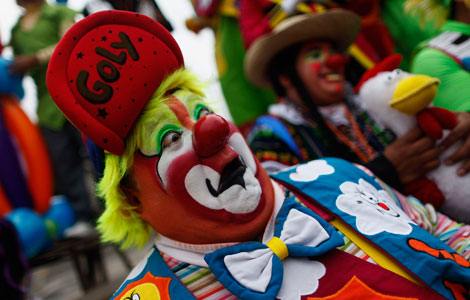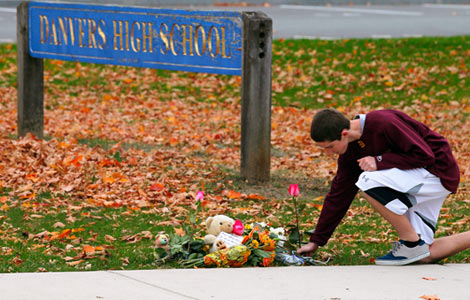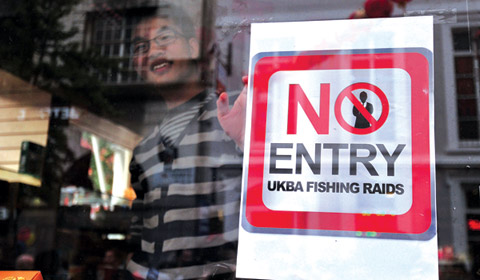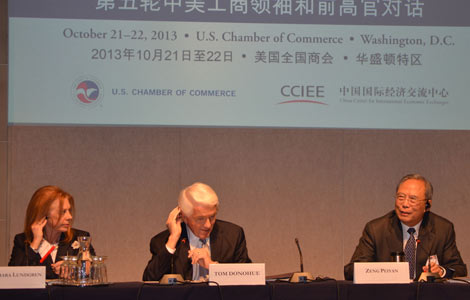US press not so free, experts say
Updated: 2013-10-24 01:17
By Pu Zhendong (China Daily)
|
||||||||
Falling short of delivering his campaign promise to bring about an "open and transparent" government, US President Barack Obama is further squeezing space for media through tight information control and aggressive prosecution of leaks, observers say.
In mid-October, the Committee to Protect Journalists, a US independent nonprofit organization based in New York, issued a special report, slamming the Obama administration for prosecuting government sources and seizing journalists' records, saying this jeopardizes the future of investigative journalism.
Experts said that Washington is tightening its information control, but meanwhile, it is still flaunting its "free press" slogan around the world while interfering with other countries' internal affairs.
Leonard Downie Jr., former executive editor of The Washington Post, wrote the 30-page analysis, which is the first time the organization has cast scrutiny on the Obama administration's relationship with the media.
"In Washington, government officials are increasingly afraid to talk to the press," said Downie, who is now a journalism professor at Arizona State University.
"The Obama administration's aggressive war on leaks and its determined efforts to control information that the news media needs to hold the government accountable for its actions are without an equal since the Nixon administration," he added.
Compared with his predecessors George W. Bush and Bill Clinton, analysts said Obama has been pursuing tighter press control out of national security concerns and constant secret divulgences.
Li Haidong, a professor of US studies at China Foreign Affairs University, said the US government has been tightening information control to fight terrorism and the US is indeed the target of many terrorist attacks.
"The Edward Snowden case, which badly stained the US' image overseas, was one example of how Washington has tightened press control in reaction to security leaks," Li said. "It exposed some loopholes in the secrecy systems of the US interior and prompted the government to realize the importance of its secrets.
"In this way, media will find that it is more difficult to supervise the government," Li added.
Since 2009, six US government employees and two contractors, including Snowden, have been prosecuted under the 1917 Espionage Act for leaking classified information to the media, in contrast to just three such prosecutions filed in all previous US administrations, the report said.
Downie interviewed numerous reporters and editors following revelations this year that the government secretly seized records for telephone lines and switchboards used by more than 100 Associated Press journalists. He also interviewed journalists whose sources have been prosecuted on felony charges.
David E. Sanger, the former chief Washington correspondent of The New York Times, described the Obama administration as "the most closed, control-freak administration I've ever covered".
Journalists and sources suspected of discussing classified information are increasingly subject to investigation, lie-detector tests, scrutiny of telephone and e-mail records and now surveillance by co-workers under a new "Insider Threat Program" in every agency, the report said.
Yu Guoming, a journalism professor at Renmin University of China, said news agencies are always vulnerable to external interventions as their acquisition and release of information may sabotage different interest groups, including the government.
"The fact that the US is using its administrative power to assail freedom has reflected its anxiety to adapt to the reallocation of social strength and resources," Yu said.
Li, the researcher, said media might strongly oppose the Obama administration and resist the policies by giving away more leaks.
"I believe the game between media and government will continue while the government keeps narrowing down its information disclosure," Li said.
However, Jay Carney, Obama's press secretary, disapproved of such complaints about transparency, saying it is part of the "natural tension" between the White House and the press.
"The idea that people are shutting up and not leaking to reporters is belied by the facts," he said.
In another response to the report, White House spokesman Eric Schultz said Obama has committed his administration to work toward unprecedented openness. He said it is the first administration to release White House visitor records.
"Over the past four years, federal agencies have gone to great efforts to make government more transparent and more accessible than ever, to provide people with information that they can use in their daily lives," Schultz said.
The administration has processed a record number of Freedom of Information Act requests and improved processing times, strengthened whistle-blower protection with a new law and improved transparency on government spending, data, lobbying and other information, Schultz said.
The Sept 11, 2001, terrorist attacks were a "watershed moment", leading to increased secrecy, surveillance and control of information, said Ni Feng, a researcher of American Studies at the Chinese Academy.
Jean-Paul Marthoz, a journalism professor at the Universite Catholique de Louvain in Belgium, said any restriction on US journalists' freedom to report inevitably reverberates around the globe, as journalists in other countries rely on the US press to report and comment on most world events.
"The sneaky surveillance and prosecution of journalists in the search for leakers have a global cost," Marthoz said.
"(The prosecutions) weaken the US commitment to defend press freedom, and embattle journalists everywhere. They also threaten to reduce the US media's freedom to report on issues of global interest and therefore restrict the news flows feeding the international media," he added.
puzhendong@chinadaily.com.cn
Most Viewed
Editor's Picks

|

|

|

|

|

|
Today's Top News
Walmart China strategy: 110 new stores
China's GDP growth to 7.6%: Standard Chartered
Scholar looks at the kung fu-hip hop connection
Starbucks' pricing furor: tempest in a coffee pot
100,000 Strong student exchange picks first partners
Report: China could profit rebuilding US
Holiday may boost sales of new iPads
US-China trade talks a 'turning point'
US Weekly

|

|














